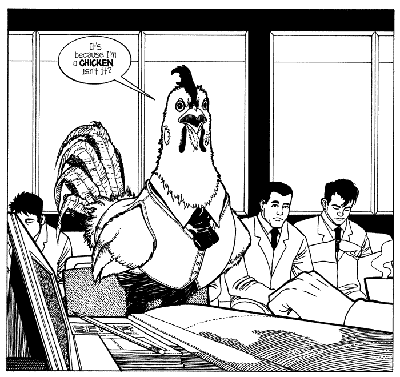assorted delights
chicken joy

Once in a while, a comic book comes along that blows everything else out of the water by the virtue of its excellence. This time around, it's "Elmer" by Gerry Alanguilan.
"Elmer" tells the story of a chicken caught up in the realities of life, deftly presented by Alanguilan whose storytelling prowess is at its finest. The textured nuances of his characterization permit observations and explorations into the themes of loss and longing, love and duty, differences and commonalities, and the confusing complexities of familial relationships. In the same manner that the Pulitzer-award winning "Maus" managed to evoke the human condition via the travails of mice, Alanguilan's anthropomorphized poultry provides a mirror for us to look at ourselves and our common concerns.
What sets this comic book apart is the author's matured storytelling, fulfilling the promise of his earlier work and continuing the natural evolution of his artistic growth. On the graphic side of things, he balances technical challenges (using a 9 panel grid, or anatomically accurate poutry) and creative expression (showing emotions in the faces and body language of his avian characters) and presents a final product that I can only imagine would be stunning in full color but works nonetheless in stark black and white.
Easily the best comic book I've read this year (including both local and imported comic books), "Elmer" is something you must read.
After reading and reading the book, I consider the author the most talented creator in the industry today, which is only fitting because Alanguilan is also the caretaker of the past of Filipino komiks. He admirably bridges the past, present and the future of Filipino graphic fiction. It is with "Elmer" that Alanguilan truly makes his mark, raising the bar high for all who would follow after.
I'm proud to have worked with him - and to call him both friend and comrade-in-comics.

With Gerry Alanguilan ("Elmer")
"Elmer" is available at ComicQuest, Comics Odyssey and Druid's Keep (P50).
my heart's joy

Nikki Alfar, wife, lover and best friend (hard to believe we're celebrating 11 years of marriage this December)
After watching "Doubt" (made potent by the performance of Cherie Gil but marred by he ill-suited casting and atrocious accent of Niccolo Manahan), we headed off for after-dinner coffee and cake at Max Brenner's, where I caught my favorite subject (she's tied with Sage, my daughter) in natural light. Sitting outside in the cool air generated by the rain, we spoke of literature with friends, savoring cigarettes and conversation.
joyful words 1: regarding salamanca and the philippine novel
In the latest issue of Panorama magazine, Dr. Cirilo Bautista writes about Salamanca (thanks to aa and Alvin for the headsup). An excerpt:
He goes on to write about how magic realism has influenced a number of Filipino authors, which is no surprise, because we "possess a consciousness which is a source spring of the unusual and the grotesque. Our geography and climate encourage extreme imagination." He cautions against it's unconsidered use, writing about the necessity of reinventing magic realism, "Filipinizing" it so that it reflects our sensibilities and not South America's. To which I heartily concur.
It's important to understand that the manner in which a story is told is just another item from the toolkit of a writer - but it is a loaded one. We need to shape the style into something that approximates the Filipino condition understanding, at the same time, that there is a certain universality to the experience of the human condition that we tap into regardless of language or culture.
Over lunch one day with writer Ian Casocot and poet Larry Ypil, I was asked: "Where are you taking the Filipino novel? Where is it going?". I never considered myself an authority on such big questions, and certainly having written a single novel does not qualify me to provide an unassailable answer. I am not the first and certainly not the best writer. However, I do have an opinion.
Kailangan unahin ang kwento at hindi ang nais ituro ng may-akda.
We need to valorize story and position it above didactic agenda. That is the direction I'd prefer our novelistic literature to head towards, regardless of how the narrative is presented to the reader (magic realism/speculative fiction is just one of many, all of them valid for as long as they prioritize story). Stories that move readers, characters that breathe and long for something, settings that become real in the mind's eye - the lessons will follow.
I would prefer to read a Filipino novel whose words, be they sad or strong, mundane or fantastical, bring me joy as a reader - by telling a story in the best way that suits the story.
And if I can contribute in that direction, I will.
joyful words 2: regarding terminos

Over at The SF Site, Rabid Transit: Menagerie (edited by Christopher Barzak, Alan DeNiro and Kristin Livdahl) is reviewed by David Hebblethwaite.
Regarding my contribution, he writes:
I'm thankful for the kind and generous reading of my work.
(As for me, I found Vandana Singh's "The Sign in the Window" and Rudi Dornemann's "The Sky Green Box" the best stories of the antho. Thanks all over again to Chris, Kristin and Alan for the opportunity.)

Once in a while, a comic book comes along that blows everything else out of the water by the virtue of its excellence. This time around, it's "Elmer" by Gerry Alanguilan.
"Elmer" tells the story of a chicken caught up in the realities of life, deftly presented by Alanguilan whose storytelling prowess is at its finest. The textured nuances of his characterization permit observations and explorations into the themes of loss and longing, love and duty, differences and commonalities, and the confusing complexities of familial relationships. In the same manner that the Pulitzer-award winning "Maus" managed to evoke the human condition via the travails of mice, Alanguilan's anthropomorphized poultry provides a mirror for us to look at ourselves and our common concerns.
What sets this comic book apart is the author's matured storytelling, fulfilling the promise of his earlier work and continuing the natural evolution of his artistic growth. On the graphic side of things, he balances technical challenges (using a 9 panel grid, or anatomically accurate poutry) and creative expression (showing emotions in the faces and body language of his avian characters) and presents a final product that I can only imagine would be stunning in full color but works nonetheless in stark black and white.
Easily the best comic book I've read this year (including both local and imported comic books), "Elmer" is something you must read.
After reading and reading the book, I consider the author the most talented creator in the industry today, which is only fitting because Alanguilan is also the caretaker of the past of Filipino komiks. He admirably bridges the past, present and the future of Filipino graphic fiction. It is with "Elmer" that Alanguilan truly makes his mark, raising the bar high for all who would follow after.
I'm proud to have worked with him - and to call him both friend and comrade-in-comics.

With Gerry Alanguilan ("Elmer")
"Elmer" is available at ComicQuest, Comics Odyssey and Druid's Keep (P50).
my heart's joy

Nikki Alfar, wife, lover and best friend (hard to believe we're celebrating 11 years of marriage this December)
After watching "Doubt" (made potent by the performance of Cherie Gil but marred by he ill-suited casting and atrocious accent of Niccolo Manahan), we headed off for after-dinner coffee and cake at Max Brenner's, where I caught my favorite subject (she's tied with Sage, my daughter) in natural light. Sitting outside in the cool air generated by the rain, we spoke of literature with friends, savoring cigarettes and conversation.
joyful words 1: regarding salamanca and the philippine novel
In the latest issue of Panorama magazine, Dr. Cirilo Bautista writes about Salamanca (thanks to aa and Alvin for the headsup). An excerpt:
Dean Francis Alfar's novel, Salamanca (Quezon City: Ateneo de Manila University Press, 2006) is now available in bookstores. It won last year's Palanca Contest for the novel in which we were the chairman of the board of judges. We found it way above the other entries for its linguistic competence and artistic merits. Later, as a reader assessing its worthiness for book publication, we gave it a positive recommendation. For Alfar has created a love story that is memorable for its emotional restraint, sustained interest, exceptional characters, and well-conceived plot. The narrative moves at an appropriate pace to render [a] unique interpretation of a slice of Philippine life. The title [says] it all - there is some magic determining the relationship of the main characters Gaudencio Rivera and Jacinta Cordova, and Alfar does sleight-of-pen that attempts to draw us into an enjoyable spell.
He goes on to write about how magic realism has influenced a number of Filipino authors, which is no surprise, because we "possess a consciousness which is a source spring of the unusual and the grotesque. Our geography and climate encourage extreme imagination." He cautions against it's unconsidered use, writing about the necessity of reinventing magic realism, "Filipinizing" it so that it reflects our sensibilities and not South America's. To which I heartily concur.
It's important to understand that the manner in which a story is told is just another item from the toolkit of a writer - but it is a loaded one. We need to shape the style into something that approximates the Filipino condition understanding, at the same time, that there is a certain universality to the experience of the human condition that we tap into regardless of language or culture.
Over lunch one day with writer Ian Casocot and poet Larry Ypil, I was asked: "Where are you taking the Filipino novel? Where is it going?". I never considered myself an authority on such big questions, and certainly having written a single novel does not qualify me to provide an unassailable answer. I am not the first and certainly not the best writer. However, I do have an opinion.
Kailangan unahin ang kwento at hindi ang nais ituro ng may-akda.
We need to valorize story and position it above didactic agenda. That is the direction I'd prefer our novelistic literature to head towards, regardless of how the narrative is presented to the reader (magic realism/speculative fiction is just one of many, all of them valid for as long as they prioritize story). Stories that move readers, characters that breathe and long for something, settings that become real in the mind's eye - the lessons will follow.
I would prefer to read a Filipino novel whose words, be they sad or strong, mundane or fantastical, bring me joy as a reader - by telling a story in the best way that suits the story.
And if I can contribute in that direction, I will.
joyful words 2: regarding terminos

Over at The SF Site, Rabid Transit: Menagerie (edited by Christopher Barzak, Alan DeNiro and Kristin Livdahl) is reviewed by David Hebblethwaite.
Regarding my contribution, he writes:
Now on to what, for me, is the best story in the book -- "Terminós" by Dean Francis Alfar. Mr. Henares is a merchant of time: if you have any unwanted memories, or time to spare, or futures you'd rather not experience, he'll take them off your hands. Miguel Lopez Vicente is a writer who has run out of ideas. On his 32nd birthday, he visits Mr. Henares, saying, "I have come to trade away all my days." We then follow Miguel back through his life, as he tries to find a suitable ending. Alfar's writing is very beautiful, lending the story an authenticity that draws the reader in. A wonderful tale.
I'm thankful for the kind and generous reading of my work.
(As for me, I found Vandana Singh's "The Sign in the Window" and Rudi Dornemann's "The Sky Green Box" the best stories of the antho. Thanks all over again to Chris, Kristin and Alan for the opportunity.)


2 Comments:
nice blog...
aws course in Bangalore
aws training center in Bangalore
cloud computing courses in Bangalore
amazon web services training institutes in Bangalore
best cloud computing institute in Bangalore
cloud computing training in Bangalore
aws training in Bangalore
aws certification in Bangalore
best aws training in Bangalore
aws certification training in Bangalore
Im obliged for the blog article.Thanks Again. Awesome.
Hyperion training
Hyperion planning online training
Hyperion planning training
Hyperion Smart View online training
Hyperion Smart View training
install sheild online training
install sheild training
ios online training
ios training
Iot online training
Iot training
Java online training
Java training
Post a Comment
Subscribe to Post Comments [Atom]
<< Home